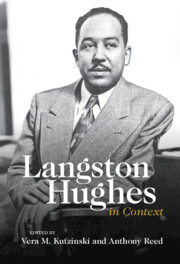Book contents
- Langston Hughes in Context
- Langston Hughes in Context
- Copyright page
- Contents
- Contributors
- Abbreviations
- Introduction
- Part I Singing America
- Part II The Global Langston Hughes
- Chapter 12 Langston Hughes and the Haitian Revolution
- Chapter 13 Taking Louise Bennett Seriously
- Chapter 14 Langston Hughes and Mexico
- Chapter 15 Langston Hughes in Spain
- Chapter 16 Langston Hughes in Cuba and South America
- Chapter 17 Langston Hughes, Colonialism, and Decolonization
- Chapter 18 Langston Hughes and Cultural Diplomacy
- Chapter 19 Langston Hughes in the Soviet Union
- Chapter 20 Translating Blackness
- Chapter 21 Langston Hughes and the Shanghai Jazz Scene
- Chapter 22 Langston Hughes’s Short Fiction in 1930s Korea
- Part III Afterlives
- Index
Chapter 12 - Langston Hughes and the Haitian Revolution
from Part II - The Global Langston Hughes
Published online by Cambridge University Press: 10 November 2022
- Langston Hughes in Context
- Langston Hughes in Context
- Copyright page
- Contents
- Contributors
- Abbreviations
- Introduction
- Part I Singing America
- Part II The Global Langston Hughes
- Chapter 12 Langston Hughes and the Haitian Revolution
- Chapter 13 Taking Louise Bennett Seriously
- Chapter 14 Langston Hughes and Mexico
- Chapter 15 Langston Hughes in Spain
- Chapter 16 Langston Hughes in Cuba and South America
- Chapter 17 Langston Hughes, Colonialism, and Decolonization
- Chapter 18 Langston Hughes and Cultural Diplomacy
- Chapter 19 Langston Hughes in the Soviet Union
- Chapter 20 Translating Blackness
- Chapter 21 Langston Hughes and the Shanghai Jazz Scene
- Chapter 22 Langston Hughes’s Short Fiction in 1930s Korea
- Part III Afterlives
- Index
Summary
Langston Hughes has earned iconic status in the history of African American letters. However, Hughes should also be understood as a radical political thinker and writer who sought to promote international anti-imperialism, Pan-Africanism, and a hemispheric understanding of Black diasporic history and culture. This chapter considers Langston Hughes’s writings on the Haitian Revolution – the play Emperor of Haiti (1936) and the opera libretto Troubled Island (1949) – as well as the presence of Haiti in Hughes’s poetry and journalism. These writings demonstrate that Haiti served as a pivot point in Hughes’s thinking, with Haitian history supplying Hughes with a heroic counter-narrative of Black freedom. Casting fresh light on the cultural currency of Haiti’s history of anticolonialism within radical African American circles, the chapter argues that Hughes’s Haitian writings carry a powerful message of an unfinished revolution, renegotiate diasporic relationships to Haiti, and proudly celebrate Black historical achievement in the Americas.
- Type
- Chapter
- Information
- Langston Hughes in Context , pp. 129 - 139Publisher: Cambridge University PressPrint publication year: 2022

